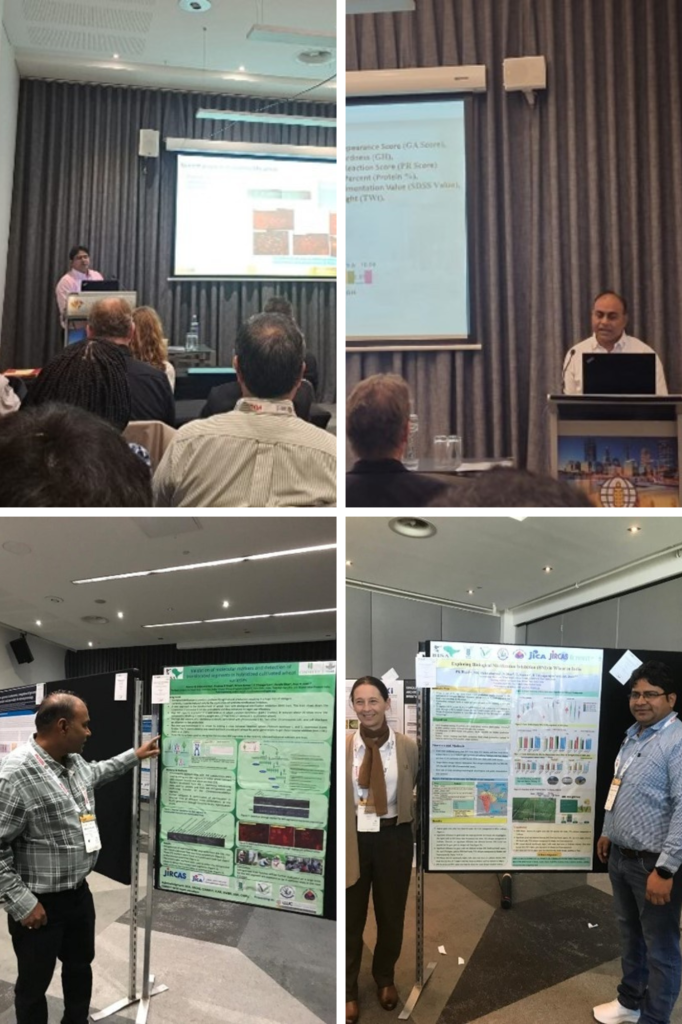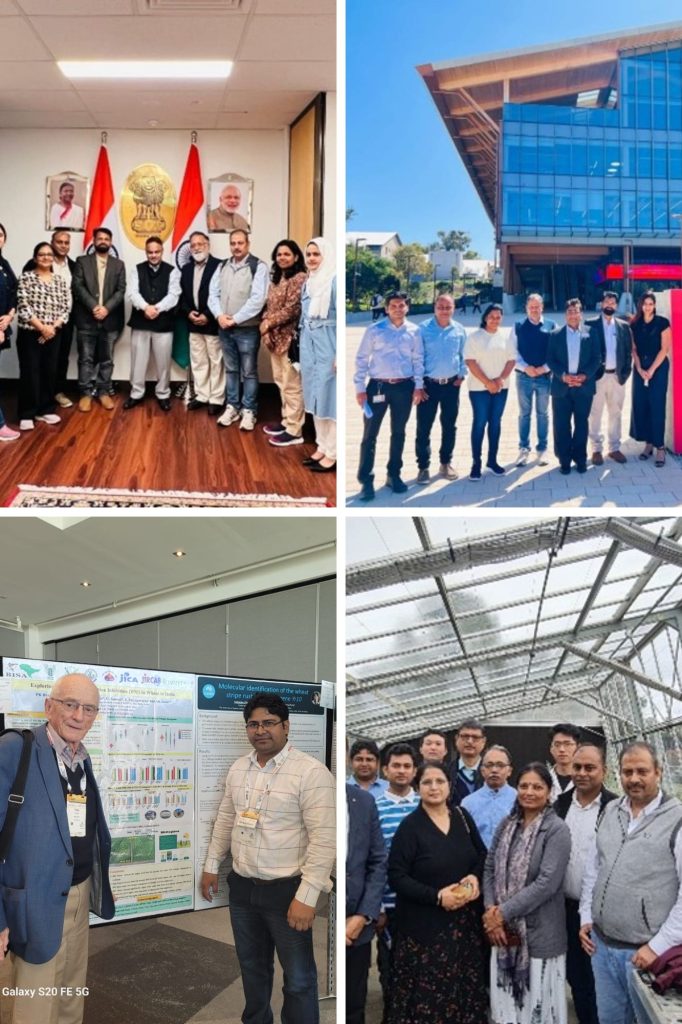Harvesting Knowledge: BISA’s Wheat Scientists Share Insights from IWC 2024
BY
September 2024 has been a fruitful month for cooperation, creativity, and intellectual exchange in agricultural sciences and wheat research. In addition to attending three significant events, the BISA researchers took the opportunity to visit the University of Western Australia and Murdoch University.
At the International Wheat Congress 2024 (IWC2024) in Perth, our scientists Dr. Manish K.Vishwakarma and Dr. Pradeep K. Bhati had the honor of delivering speeches at conferences and displaying three
posters. Through these experiences, they interacted with a dynamic worldwide network of experts and gained a deeper understanding of crop science.
Professor Rajeev Varshney, the Centre for Crop and Food Innovation (CCFI) director, convened the first mini-symposium at Murdoch University. On September 17, 2024, Dr. Manish gave a session titled “BISA/CIMMYT-India: Research Milestones and Insights.” He provided insights on the ongoing work being done by BISA-CIMMYT on phenomics, genomics, and cutting-edge methods and technologies that intersect with food security. This discussion got off to a remarkable start because of the audience’s keen interest and participation. They visited Murdoch University’s Speed Breeding facility, Long-Reach farm, and Genomics lab. This was a chance to investigate climate-resilient agriculture and link Indian efforts locally with worldwide research.
The second event in this realm was the Plant and Animal Genome (PAG)-Australia Conference. Dr. Manish spoke at the PAG Conference about the role of “Genetic Dissection of Anther Extrusion, a Critical Trait for Hybrid Wheat: A Genome-Wide Association Study” shortly after leaving Murdoch University. This subject was closely related to the evolution of hybrid wheat crops.
This conference offered a fantastic forum for establishing contacts with like-minded individuals and interacting with scholars worldwide. Prof. Rajeev Varshney arranged a highly productive discussion between Indian scientists and Amarjeet Singh Takhi, Consulate General of India in Perth, during PAG-Australia. During their fruitful conversation, Amarjeet discussed the state of agricultural research today and expressed gratitude for the achievements of BISA, ICAR and Indian Universities achievements.
The third event was the International Wheat Congress (IWC2024) which was held on September 22–27, 2024. It was organized by Murdoch University’s Centre for Crop & Food Innovation and the WA State Agricultural Biotechnology Centre. The 900 greatest brains in wheat research and breeding from 57 different nations came together for this conference, where Dr. Manish and Dr. Pradeep had a chance to give talks and showcase additional work in the form of posters. Using a GWAS investigation, Dr. Manish revealed “Wheat’s value-added quality traits”. A session titled “An overview of BNI wheat research in India” was delivered by Dr. Pradeep. At IWC2024, discussions about how genomic techniques can improve wheat quality in an ever-changing climate scenario particularly in light of BISA’s BNI-wheat study.
Scientists also got the chance to present three posters at IWC2024 in addition to the discussions. These posters focused on the biofortification of wheat crops, BNI molecular study, and BNI-Wheat field trials. The poster sessions provided a relaxed environment for in-depth discussions with participants, some of whom shared intriguing viewpoints that we plan to incorporate into my current research. Additionally, Dr. Bram Govaerts presented “CIMMYT International Wheat Research Perspectives,” Dr. Gyanendra Pratap Singh discussed “Management and Utilization of Plant Genetic Resources in India,” and Dr. Ratan Tiwari chaired the panel discussion on “Wheat Production, Research, and Trade in Major Wheat-Growing Regions,” alongside various talks from leaders in the wheat sector.
Overall, the International Wheat Congress was an enriching experience. The event, featuring poster sessions and keynote speeches, highlighted the importance of collaboration and innovation in crop science. Perth proved to be an ideal location for these discussions, offering valuable insights into the future of sustainable agriculture. The visit to the University of Western Australia (UWA) was the final stop on the researcher’s itinerary. There, Hackett Professor Kadambot Siddique outlined the ongoing research at UWA, including projects in metabolomics, proteomics, and product development.
Reflecting on these three events, the most striking aspect was the level of collaboration and the global commitment to tackling agricultural challenges through innovative science. The insights shared on genomics-assisted breeding, proteomics, metabolomics, and phenomics are vital for enhancing global food security.
Western Australia has made a lasting impression, not only as a hub of cutting-edge agricultural research but also as a place characterized by warmth and a collaborative spirit. We conclude this journey with renewed energy, eager to apply the lessons learned to our future work.

